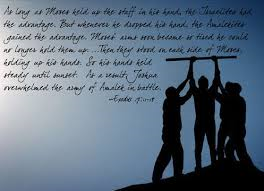Click here to return to Blog Post Intro
Moses Prepares His Leadership Transition with Joshua
Throughout the 40 years of wandering by the Israelites described in Exodus and Numbers, Moses prepared Joshua for leadership. Joshua would inherit the leadership role just as Israel was preparing to take the land from the Canaanites, who had well-equipped armies.
In Exodus 17:8-13, God intervened in the battle in a visible and memorable way.
Then, God told Moses to “make sure Joshua hears it” (Exodus 17:14). Why? Because Joshua still needed development as a leader. Joshua needed to acknowledge that God alone was the source of his power. Without God’s intervention, Joshua could have never gone head-to-head with the Canaanite armies.
Moses practiced situational leadership with his young protégé by identifying those areas in which Joshua was in need of skill and attitude development. Moses then matched his leadership action to his follower’s need.
Jesus Develops Each of His 12 Disciples
Jesus demonstrated situational leadership in effectively developing each of his 12 disciples. He:
- Instructed them when they were uninformed
- Directed them when they were confused
- Prodded them when they were reluctant
- Encouraged them when they were downhearted
When they were ready, he assigned limited tasks and responsibilities; and he participated with them, guiding them through their assignments. Finally, he empowered and commissioned them as his apostles.
The Master Teacher shows us that effective leadership is situational. Effectiveness in leadership is driven by what the followers need. Jesus always interacted with his disciples and responded appropriately to the situation. And within three years, this band of unknown men began to change the world.
Paul Adapts to His Followers
Jesus transformed Saul—the zealous Pharisee—into Paul: apostle to the Gentiles. Through his experience of seeing Jesus on the road to Damascus, Paul understood what it meant to make a midcourse correction; and his passion to see people reconciled to God gave him the willingness to approach each situation in a case-specific manner.
Paul’s desire was to see as many people as possible come to faith in Christ. He wrote, “I have become all things to all people so that by all possible means I might save some” (1 Corinthians 9:22). As a result, he would act liked one under the law or not under the law, depending on whether he was working with Jews or Gentiles.
In Colossians 4:5-6, he said, “Be wise in the way you act toward outsiders, make the most of every opportunity. Let your conversation always be full of grace, seasoned with salt, so that you may know how to answer everyone.” For Paul, to season graceful conversation with salt was to painstakingly adapt his approach to each situation he faced.
Paul’s training of his co-laborers also showcase his situational leadership skills. To Titus, he sent instruction. To Timothy, he offered encouragement. He prepared and trained workers to continue what he began in several cities, adapting the training to the specific needs of each worker. In this way, he equipped a number of co-laborers and delegated increasing responsibilities to them.
How flexible are you regarding changing circumstances? Do you find yourself trying to change the circumstances you’re in? Out of This World Leaders change their game plans instead. May you make the necessary adjustments today, adapting your leadership to the situation and the person as you shoot for the stars!



